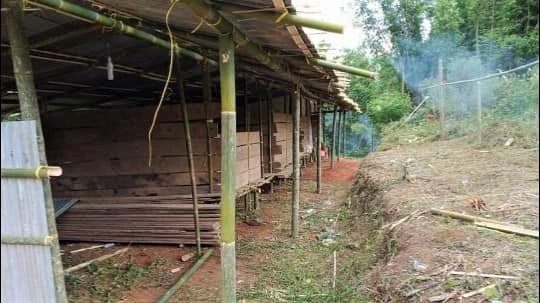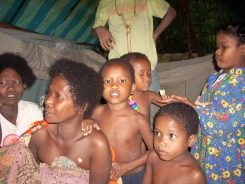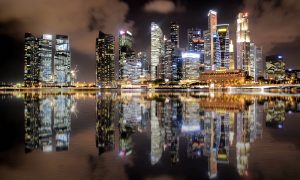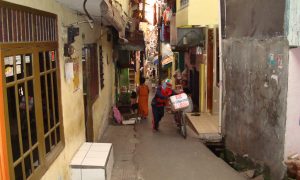“For hundreds of years, we’ve been practising so-called self-quarantine. Long before the recent COVID-19 outbreak. We called it besesandingon,” Tumenggung Tarib told me. Tumenggung Tarib is an elder of Orang Rimba, an Indigenous community who live within the Bukit Duabelas National Park in Jambi, Sumatra. Since mid-March, besesandingon has been actively used as a way to mitigate the spread of COVID-19.
“It was started when we received the letter from Rukka Sombolinggi, the General Secretary of AMAN. She asked everyone to be prepared to implement a self-initiated lock-down to prevent virus outbreaks.” AMAN is an abbreviation of Aliansi Masyarakat Adat Nusantara or the Indigenous Peoples Alliance of the Archipelago, the only Indigenous association in Indonesia. It was established on March 17, 1999, in Jakarta. Tumenggung Tarib was there when it was declared, representing his community. They have been members of AMAN since then.
According to the Indonesian Bureau of Statistics in 2018, the Orang Rimba population was less than 3000. They are divided into 13 different groups who occupy different ancestral domains in a territory that has been unilaterally designated by the State as a national park. Orang Rimba are known for their semi-nomadic lifestyle, where besesandingon is an integral part of their cultural practices around exposure to the outside world.
“Besesandingon is no longer as strict as it used to be, due to the influence of our interactions with outsiders. But since the coronavirus outbreak, besesandingon has become tighter. Everyone must obey and follow the steps carefully. If they violate the rules, of course, there is a customary punishment,” Tumenggung Tarib said. Besesandingon is an obligation for any member of the Orang Rimba who have just returned from travel. One is not allowed to immediately re-enter the village until they have undergone self-isolation. The goal is to ensure that there is no disease is brought in from outside which might infect others. They build a sudung or a hut not far from the main village and erect signs surrounding it to let others know that they need to keep their distance.
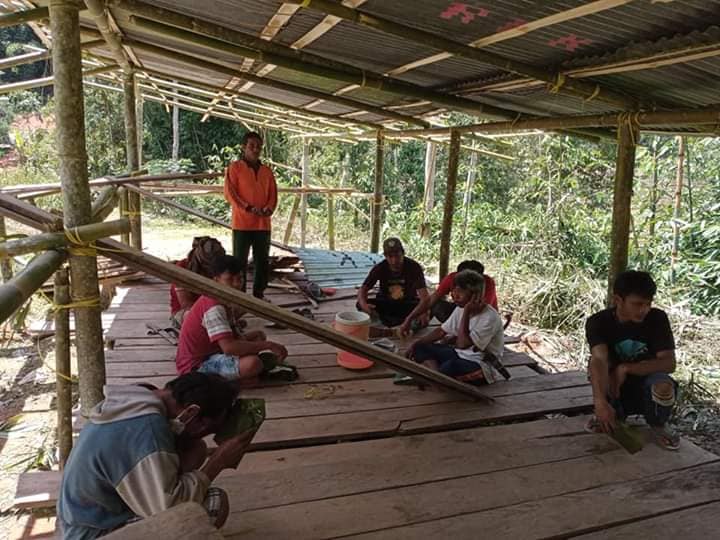
Photo by Laso’ Butungan.
“However, besesandingon does not mean that someone who is doing self-quarantine will be an outcast. The community look after you, a traditional healer will regularly check your condition, and family will provide food. After a week with no symptoms of sickness, one will be welcome to re-enter the community,” Tumenggung Tarib said.
Laso’ Butungan, the Lembang (village) Chief of Lea, Makale, Tana Toraja also has done similar things. “We build the quarantine chambers to welcome our family who are coming from outside of Toraja,” Laso’ told me. “We are calling our family to come home while ensuring no one’s health is being put at risk,” he added. The rooms are furnished with a bed and pillows in each and are built from bamboo, boards and roofing donated by members of the community. The construction of the quarantine chamber was carried out in mutual cooperation with reliance on village resources. Public kitchens were also built to ensure food supplies for those undergoing quarantine.
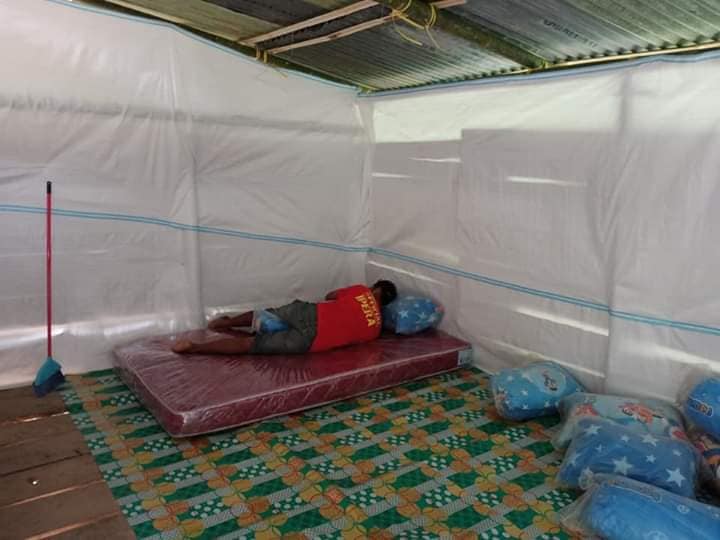
Photo by Laso’ Butungan.
“This is what we, the Indigenous, call a dignified quarantine,” Rukka Sombolinggi said. “Which is that no person who returns home is seen as a problem carrier. On the contrary, they are displaced people. They are leaving the city behind because it no longer offers a sense of safety. The only thing that can make them feel safe is to be with their family and community.”
Rukka knows that feeling well. As a Torajan woman, an Indigenous community in the highlands of South Sulawesi, staying in Jakarta is simply gambling with life. “My family keeps asking me to go back home because Jakarta is no longer safe,” she added. Since the COVID-19 outbreak back in early March, Jakarta has become the epicentre of COVID-19 in Indonesia.
The virus is spreading exponentially across the nation, and many believe that the number will keep growing as millions head back to their hometowns to celebrate religious festivals. “This is why a dignified quarantine plays an important role in the solution. We are giving direct answers to fight the virus and to offers sanctuary for our family who are seeking it,” Rukka said.
AMAN knows well that Indigenous people should not rely on the State. As the most vulnerable to COVID-19, the Indigenous Peoples once again need to show that they can stand on their own feet.
Death amid oil palms: Malaysia’s Batek Orang Asli health crisis
Public shock should be channelled towards real empowerment of indigenous communities.
However, Rukka highlighted that those initiatives are possible when Indigenous peoples still live in harmony with nature. They have proven to have adequate resources for fighting the COVID-19 outbreak. “Still, Indigenous communities without secure tenurial rights, and particularly those whose lands have been seized and are forced to live as oil palm farmers are among the most threatened because of their simultaneous interconnection to global supply chains, and lack of state health care and services,” Rukka said. “This is why the Indigenous Peoples Rights Law needs to be ratified. Without recognising Indigenous rights, particularly in the time of COVID-19, you will kill us slowly.”
 Facebook
Facebook  Twitter
Twitter  Soundcloud
Soundcloud  Youtube
Youtube  Rss
Rss 